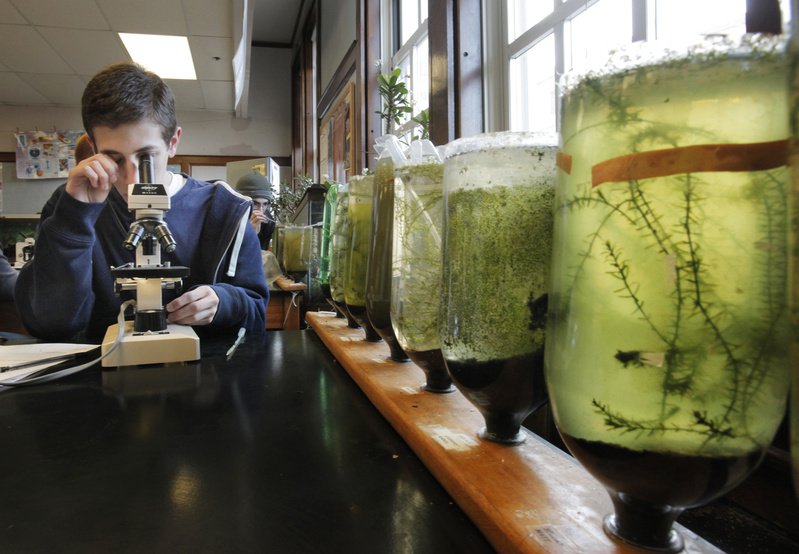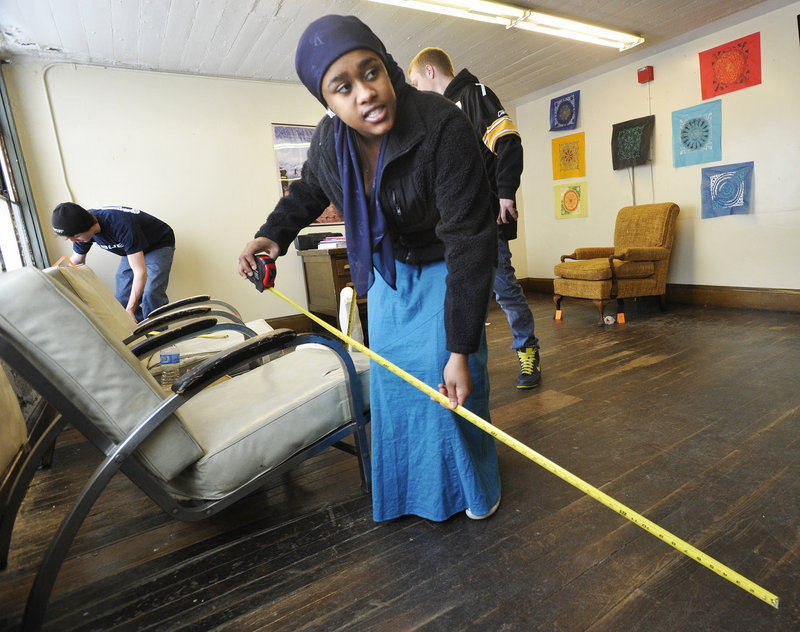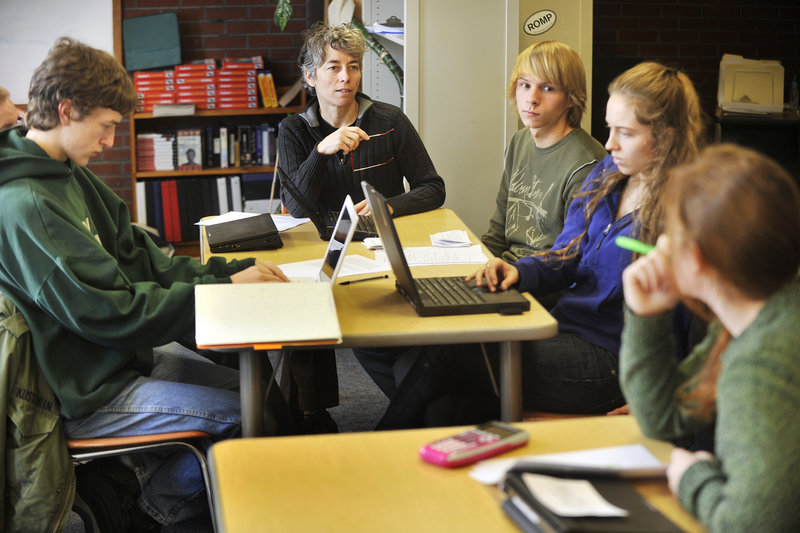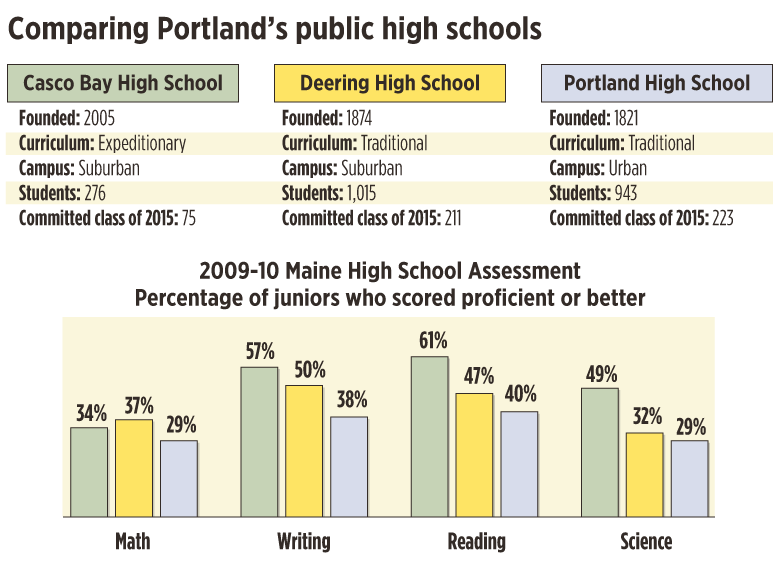PORTLAND – About this time each year, more than 500 eighth-graders must decide which of the city’s three public high schools they will attend.
It’s an opportunity and a challenge that’s unique to Maine’s largest school district.
It’s also a complicated process that has grown frustrating for some students and increasingly competitive for school administrators since the district opened Casco Bay High School in 2005 and its nontraditional curriculum proved successful.
The annual pursuit of eighth-graders peaked on Feb. 8, when Casco Bay High held a lottery to choose 75 students from 126 applicants for next fall’s freshman class. Principals at Portland and Deering high schools waited attentively through last week to learn where the remaining 51 Casco Bay hopefuls would go.
“Since Casco Bay had their first lottery last year, the whole process has gotten more intense,” said Ari Hymoff, a Deering High junior who is an elected student representative to the school board. “I think the sense of the lottery is drawing a lot of people and the smaller community at Casco Bay is starting to show up as a popular choice.”
The growing intensity of the eighth-graders’ selection process is raising concern about its effect on students and their families and its impact on the three high schools and their staffs. Most people involved see both advantages and drawbacks.
“Portland students are fortunate to have a choice,” said Portland High Principal Mike Johnson. “It’s also a dilemma because that choice is not easy to make. Many students, many families, agonize over that choice. It can be a lot of pressure for 13- or 14-year-old kids who are on the fence.
“But wherever you go, you’re going to be fine,” Johnson continued. “That was true when I chose to attend Portland High back in the 1970s, and that’s true today with Casco Bay in the mix.”
Deering High Principal Ira Waltz said the competition is good as long as it doesn’t pit one school against the others. Casco Bay Principal Derek Pierce agreed.
“A little bit of competition helps keep all of us accountable, because we know each year that all of us are being judged by where students decide to go,” Pierce said. “But we’re all on the same team, and our overall goal is to make sure students succeed.”
Students say the decision is influenced by personal perception and public opinion about academics, sports and other extracurricular programs at each high school. Where parents and siblings went, or where their friends want to go, also influences a selection process that many describe as a friendly rivalry.
Portland High’s urban campus and Deering High’s suburban campus can be seen as pluses or minuses, depending on an eighth-grader’s point of view. Students can change schools if their choices don’t work out, but principals count on commitments in February to plan budgets and staffing for the coming school year.
Principals woo eighth-graders and their parents with middle school presentations and high school open houses. Eighth-graders are invited to spend a day “shadowing” a freshman at each high school.
Portland High in particular saw a spike in interest this year, with 210 eighth-graders shadowing freshmen, compared with about 100 last year, said Assistant Principal Stephen Rogers.
The middle school that eighth-graders attend — King, Lincoln or Lyman Moore — has long been a good indicator of which high school they will choose. King students often pick Portland High (both are downtown); many Lincoln students choose Deering High (both are on Stevens Avenue); and Lyman Moore students usually split between the two traditional high schools.
Casco Bay attracts King students who want to continue the interdisciplinary, project-based learning model that both schools follow, as well as students from the other schools.
As of Friday, Portland had signed up 223 eighth-graders for its class of 2015, while Deering had signed up 211 and Casco Bay had signed up 75. Twelve eighth-graders had yet to choose.
A proposal before the school board calls for increasing Casco Bay’s freshman enrollment to 93 students next fall, which eventually would produce a maximum four-year enrollment of 372 students.
A controversy cropped up over Casco Bay’s lottery this year because it didn’t guarantee seats to siblings of current students. Though siblings were given some preference, students were selected randomly, with weight given to reflect the district’s demographics for race, income level and special-education needs.
As a result, five of 12 siblings who applied to Casco Bay initially didn’t make the cut, including Emma Maasch’s younger brother, Fox.
Casco Bay students and parents petitioned school officials to give the siblings seats they thought were guaranteed. Citing a communication error, school officials relented and accepted the five siblings. Casco Bay’s leadership team plans to review the lottery policy this spring, Pierce said.
“I was surprised and sad when my brother didn’t get in because I knew he would be a great addition to Casco Bay,” said Emma Maasch, a Casco Bay sophomore who is an elected student representative to the school board. “Each school has perks for different types of learners, but it’s sad to think that kids who really need what Casco Bay offers won’t be able to attend.”
Maddie Holton had a difficult time choosing a high school. A year ago, she was an anxious eighth-grader, trying to decide whether she would attend Portland or Deering. Her mother is school board member Liz Holton, and her older brother, Nick, is a senior at Deering.
Maddie calculated the academic and extracurricular assets of each school. She even flipped a coin, then changed her mind again. In the end, it came down to the fact that most of her friends at Lyman Moore chose Portland High.
“It was really overwhelming to think about something that would affect the rest of my life,” Maddie said. “I almost decided to go to Deering. I think they’re both great schools, but I’m glad I went to Portland.”
Some worry that the growing competition will undermine the district’s effort to encourage greater sharing of students, teachers and resources among the three high schools, especially with budget challenges looming.
“If we’re fighting for resources, we’re going to kill all three of them,” said Jaimey Caron, the school board’s finance chairman. “Kids are choosing, and we need to respond to our customers. We can’t let tradition get in the way of providing what’s best for our kids.”
Superintendent Jim Morse said he believes the competition is healthy as long as it leads the high schools to develop what’s unique about their programs, share other resources and avoid duplication overall. A $200,000 Nellie Mae planning grant will help the district do that, Morse said.
Morse agrees with Ari Hymoff, the Deering junior, who said the three high schools should operate as facets of one campus, offering courses on a shared schedule that’s available to all students.
This year, the three high schools started offering shared courses at the start and end of each school day, but most of their schedules remain fundamentally different and separate.
Morse plans to promote better coordination of high school programs across the district.
“Program offerings would become much richer,” Morse said. “Ultimately, students would be able to choose courses based on what they need. The focus would be more on the programs themselves and less on the structure in which they’re offered.”
Staff Writer Kelley Bouchard can be contacted at 791-6328 or at:
kbouchard@pressherald.com
Send questions/comments to the editors.







Success. Please wait for the page to reload. If the page does not reload within 5 seconds, please refresh the page.
Enter your email and password to access comments.
Hi, to comment on stories you must . This profile is in addition to your subscription and website login.
Already have a commenting profile? .
Invalid username/password.
Please check your email to confirm and complete your registration.
Only subscribers are eligible to post comments. Please subscribe or login first for digital access. Here’s why.
Use the form below to reset your password. When you've submitted your account email, we will send an email with a reset code.